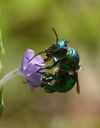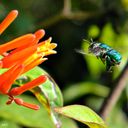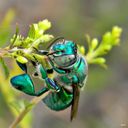Orchid Bees
Euglossini
Classification
- Phylum: Arthropoda
- Subphylum: Hexapoda
- Class: Insecta
- Order: Hymenoptera
- Family: Apidae
- Subfamily: Apinae
- Tribe: Euglossini
Pronunciation
How to pronounce Euglossini: //juːˈɡlɒsɪˌnaɪ//
These audio files are automatically generated. While they are not always 100% accurate, they are a good starting point.
Images






Summary
Euglossini, or orchid bees, are a tribe of corbiculate bees characterized by their metallic coloration and unique behavior regarding fragrance collection. They include solitary and some communal species, with males collecting volatiles from orchids to attract potential mates. Their ecological role as pollinators is crucial to certain orchid species, and they exhibit distinctive methods for accumulating and using these fragrances.
Physical Characteristics
Brightly metallic colored; long tongue; apical spurs on metatibia; hind wings without jugal lobes; scutellum produced backward.
Identification Tips
Look for brilliant metallic coloration, primarily green, gold, and blue; presence of modified legs in males for fragrance collection.
Habitat
Primarily found in South and Central America; also established in Florida, USA; species reported from Arizona and Texas.
Distribution
About 200 described species in five genera, with Euglossa dilemma established in Florida; others reported from southern US regions including Arizona and Texas.
Diet
Females gather pollen and nectar from a variety of plants; males primarily collect volatile compounds from orchids and other plant families.
Reproduction
Males do not return to nests after hatching; mating takes place in display sites within the forest understory.
Ecosystem Role
Pollinators of orchids; play a significant role in the reproductive success of specific orchid species.
Collecting Methods
- Using synthetic compounds as bait
- Collecting males for study
Evolution
The relationship between male euglossine bees and volatile chemicals is unique among animals; demonstrates an example of Zahavi's handicap principle.
Similar Taxa
- Other corbiculate bees
- Various types of bees, wasps, flies, and moths that also pollinate orchids
Misconceptions
Male orchid bees were early thought to be females in relation to Darwin's early findings on their role in orchid pollination.
Tags
- Euglossini
- Orchid Bees
- Pollinators
- Fragrance collection
- Neotropical